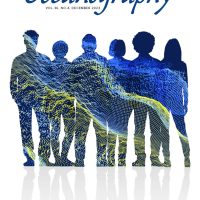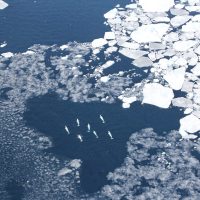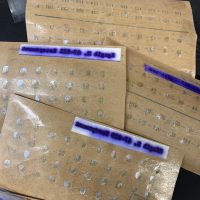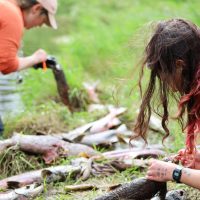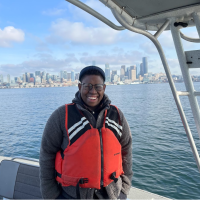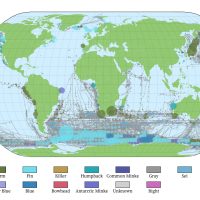Filter Results
Special issue on Building Diversity, Equity, and Inclusion in Ocean Sciences features SAFS scientists
With contributions from SAFS scientists including Jackie Padilla-Gamiño, Corey Garza and Xochitl Clare, Oceanography’s special issue addresses structural and cultural obstacles encountered by underrepresented and marginalized scholars.
Read moreListening closely: Using acoustics to study Greenland’s marine mammals
Recently completing her PhD focused on marine mammals in Greenland, Marie Zahn’s work in the Arctic provides a deeper look into two species: narwhals and belugas.
Conducting her research at the School of Aquatic and Fishery Sciences (SAFS) as a member of the Laidre Lab, Marie explored the marine habitat and sounds produced by narwhals and belugas using oceanographic and acoustic data collected from West Greenland.
Vital communications among the critically endangered Cook Inlet belugas may be masked by ship noise
New research led by SAFS doctoral student, Arial Brewer, documents the vocal repertoire of Cook Inlet beluga whales for the first time.
Read moreSalmon, scales, and spectrometry: analyzing historical fish scales to explore food web changes over time
For over 60 years, the Alaska Department of Fish and Game have collected scales from sockeye salmon in Bristol Bay. Now, these scales are receiving special treatment in a new project led by SAFS graduate student Grace Henry, who is conducting stable isotope analysis to examine how food webs in the North Pacific Ocean have changed since the 1960s.
Chemistry has always been Grace’s biggest interest: “I love chemistry, and for me, it’s the cornerstone of ecological science.” Working with stable isotopes in her pre-graduate studies, Grace wanted to use this method during her thesis work on food webs using historical archived samples.
Part 2 of our video series featuring the Alaska Salmon Program now live
Watch Part 2 of a summer with the Alaska Salmon Program, now live, featuring the students who are essential to the program.
Read moreStudying toxic metals in fish in southeast Asia’s largest freshwater lake
In the largest freshwater lake in southeast Asia, Shorna Sabikunnahar is looking into the ecological and environmental drivers of toxic metals in resident fish.
Conducting her research on Tonle Sap Lake in Cambodia, which is part of the Mekong River system, Shorna is a SAFS PhD student in the Holtgrieve Ecosystem Ecology Lab (HEEL). Designated as a Biosphere Reserve by UNESCO, Tonle Sap Lake is one of the most diverse and productive ecosystems on the globe.
Diving deep into how fish impact carbon cycling in the ocean
Recently featured in Hakai Magazine’s article “All The Fish We Cannot See”, SAFS PhD student Helena McMonagle is conducting a deep dive into a hidden cache of fish that might play an unexpected role in how the ocean sequesters carbon. We caught up with Helena to find out more about it.
Since starting this research in 2019, I’ve been using data collected at sea and in the lab, along with bioenergetic models, to estimate how much carbon these mesopelagic fish, such as lanternfish, transport from surface waters into the twilight zone.
Working with the Port of Seattle during a Washington Sea Grant Fellowship
Selected as the 2022–2023 Washington Sea Grant Keystone Fellow, Ashley Townes spent a year working with the Port of Seattle’s maritime habitat team on advancing the development and implementation of innovative habitat restoration projects including kelp research, fish sampling with underwater remote operated vehicles (ROVs) and 360-degree cameras, and bankline monitoring to survey the condition and character of shorelines at port facilities in the Lake Washington Ship Canal, Shilshole Bay, Elliott Bay, the East and West waterways and the Duwamish Waterway.
Read moreWhaleVis turns more than a century of whaling data into an interactive map
A team at UW, including Trevor Branch from SAFS and Zoe Rand from QERM, have created an online interactive map called WhaleVis, which lets whale researchers visualize the IWC’s data on global whale catches and whaling routes. From this, researchers can estimate the animals’ spatial distribution and the effort whalers put into hunts.
Read moreCelebrating LGBTQ+ in STEM
Celebrating and highlighting the work of LGBTQ+ people in science, technology, engineering, and math (STEM) has a special day on the calendar: November 18. Why this date? It is based on the 60th anniversary of American Astronomer and gay activist Frank Kameny’s fight against workplace discrimination, which he took to the U.S. Supreme Court.
Science is a place of innovation, research, and progress, but many communities are still marginalized in these spaces.
Read more